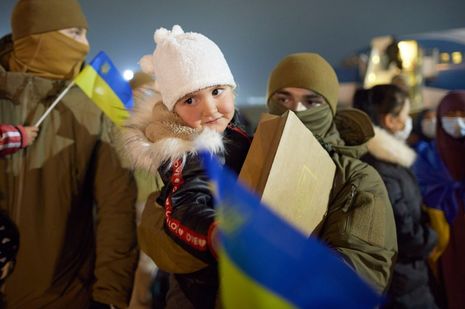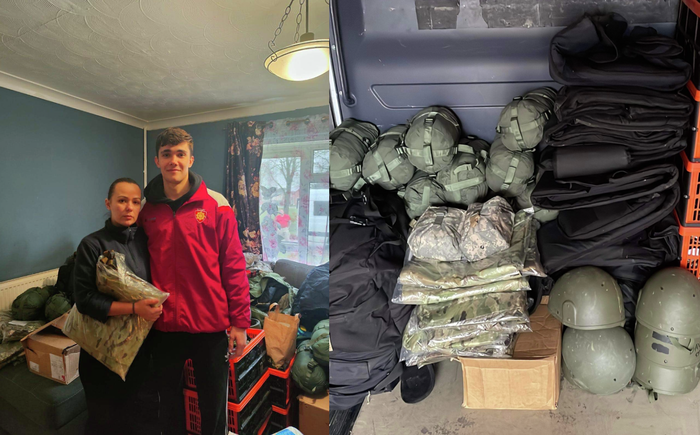What finding hosts for Ukrainians refugees taught me about hope and solidarity
Negotiating with German border officials over the phone reminds me why I’m studying MML

It’s the middle of the night; I am struggling through the fourth paragraph of an essay when my typing is interrupted by a phone call in rapid, panicked Russian. Sofiia’s flight is leaving in an hour and they aren’t letting her on the plane. Are they going to force her to go back to Ukraine? She passes the phone to the German border official, imploring me to say something. In this moment I understand why I’m studying MML.
By the next morning, Sofiia is in England. My essay remains unfinished.
I met Sofiia in Warsaw in August. There was a heavy downpour. On the corrugated metal roof of the refugee centre, the rain drummed, sudden and intense. Sofiia looked at me, eyes wide. They’re shooting outside! Watch out! I shook my head gently. Rain. It’s just rain. A few seconds later, the fear dissolved and she was almost apologetic, explaining her immediate reaction as if it was just a tiny, trivial thing she sometimes forgot. I cannot forget that her first thought was to warn and protect me.
Even now, the sound of heavy rain puts me on edge. My instinct is to look around me, to reassure the people I’m with. It’s the same with airplanes in the sky. One afternoon, we were sitting outside on the patio with plates of fruit and birthday cake. A plane flew overheard: before I even registered the sound, the party fell silent and I could hear the quiet words of a mother reassuring her daughter: it’s just a nice plane taking off.
I was volunteering with Love Bristol, one of the UK’s few officially-recognised charities helping to find hosts for Ukrainian refugees. Work started early and continued into the night. Some days we sat waiting for replies from potential hosts, listening to the silence on the end of the phone; at other times, we were overwhelmed by the generosity and kindness of strangers opening their homes and their hearts to those in need. Then came the circles of bureaucracy, pleading with governmental officials to find out what had happened to missing visas. Tears in the foyer of the visa centre, anxious pacing back and forth inside the hostel.
We spent some time in PTAK, the largest refugee camp for Ukrainians in Europe, and somehow, we were the UK’s official presence: the first time I was there, we were just two undergraduate students standing in front of a sign with a Union Jack. All around us were the discarded remnants of earlier bursts of altruism: desks littered with Norwegian flags, a huge poster with Ukrainian text celebrating how lovely and welcoming Spain is. We turned it around and used it as a plain white background for someone’s visa application photo. Now we have gone too.
The rain is not as bad when we are standing together on King’s Parade, singing the Ukrainian national anthem
The hostel, shared by around 25 Ukrainians and volunteers, was an oasis in the midst of a hostile world, managed by a wise and enigmatic Polish lady. I shared a room with Katya, an environmental activist who had escaped from Russia on foot with a small backpack following the arrests and disappearances of friends. Late at night we discussed collective guilt and the meaning of psalms.
Every morning, Vlada, the de facto babushka of everyone who crossed her path, would cook borshch and little oladushki pancakes for the whole household: I made her write down the recipe for me before I left. A month later, back in the UK, I came to the airport to greet her and her husband, translating between them and their host; I hope that her Ukrainian cooking has helped to fill in the gaps of the language barrier.
It was late; we sat around the kitchen table talking in a glorious mess of Russian, Ukrainian and Polish all at once; we raised our glasses in a toast to health, peace and visas. Anton’s family had waited months for their permission to travel into the UK and gave us their evaluative reviews of all the refugee camps in Poland. Anton, the tough and stoic steelworker, always wore a necklace with multicoloured plastic beads, a gift from his little daughter. He showed us pictures of his home, videos of his co-workers joking around. I asked him about his work, but heard only one word: Azovstal. His daughter’s primary school no longer exists. But yet they still described their native Donbas as a kind of paradise, a kaleidoscope of languages and cultures and wonderful people. I need to visit sometime, they told me. Someday I will.
Sitting in a taxi on the way back from the visa centre, I asked Olesya if she planned to go back home once the war is over. She said she would never feel safe in Sumy, right on the border with Russia. Her seven-year-old son was reading aloud from a book about beavers that had been handed out by a Canadian governmental administrator, while Olesya talked about the mines which have been laid all over the countryside. All she wanted was for her son to be able to run around in the forest and be a child. Months later, I watched him climb the trees in a park in Bristol.
The people I met did not allow themselves to be broken by what they had endured; joy and hope exist in defiance against the forces of evil. One moment, we were laughing about a frog that had hopped into a cereal bowl, the next we were sitting cross-legged on a darkened landing, whispering about fear, about death, about experiences that no one should have to live through. And then the light is switched on and we have to be strong again. Words, regardless of what language they are uttered in, cannot entirely convey the pain, or the solidarity and love.
Three months later, I am still torn between worlds, trying to navigate the jarring contrasts. I am standing in my college chapel, rehearsing music for evensong; my phone screen lights up and it is a message from someone in Kyiv, pleading for help. They are shelling our city, it’s less than a kilometre away. I put my trust in God, and in you, and the sponsor that you will find. I spend the evening organising transport for someone to Berlin so that she can submit biometric data for her British visa, and postpone my work due the next morning. I come back from a formal and spend half an hour filling in a visa application form for a teenager whose parents are left behind in occupied territory.
But these alternate realities can be bridged. A message sent from a bomb shelter, wishing me good luck with my Ukrainian lessons. A phone call from a potential host who is a Cambridge alumnus, asking me if supervisions were the same as they were 45 years ago. The rain is not as bad when we are standing together on King’s Parade, singing the Ukrainian national anthem.
 Features / Should I stay or should I go? Cambridge students and alumni reflect on how their memories stay with them15 December 2025
Features / Should I stay or should I go? Cambridge students and alumni reflect on how their memories stay with them15 December 2025 News / SU reluctantly registers controversial women’s soc18 December 2025
News / SU reluctantly registers controversial women’s soc18 December 2025 News / Dons warn PM about Vet School closure16 December 2025
News / Dons warn PM about Vet School closure16 December 2025 News / Cambridge study finds students learn better with notes than AI13 December 2025
News / Cambridge study finds students learn better with notes than AI13 December 2025 Arts / A beginner’s guide to Ancient Greek tragedy16 December 2025
Arts / A beginner’s guide to Ancient Greek tragedy16 December 2025









